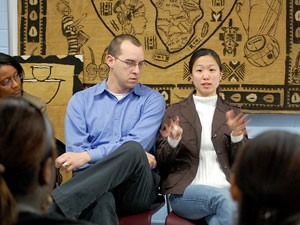Nearly 50 students, faculty and alumni gathered for a panel discussion Wednesday in the Martin Luther King Jr. Student Center, tackling the touchy and often overlooked area of interracial relationships and how to deal with society’s views on them.
The open discussion allowed the audience to ask specific questions to the panel, “”The Case of Interracial Marriage in the US,”” while statistics about interracial marriage played on slides in the background.
“”Panels like this really help open up people’s mind and see the issues other people deal with on a daily basis,”” said Ricky Watson, a sophomore majoring in creative writing and history, whose parents are an interracial couple. “”They not only tell you about it but they show you with the people on the panel. Plus, it’s always good and new information is always a good thing to have.””
According to the U.S. Census Bureau and the slides presented at the panel, interracial marriage has jumped from 310,000 in 1970 to 2,669,558 in 2000, constituting around four percent of all marriages.
“”Things like this are important so people can learn from what others have to say,”” said Kathryn Foster, a UA alumna and daughter of an interracial couple. “”My mother was Native American and my father was black, and they weren’t allowed to get married in Tucson until 1952. This just shows how things have changed since people are talking openly about it.””
The members of the panel shared personal information about how they met their significant others and the challenges they faced from family, friends and society.
Bruce Smith, director of African American Student Affairs, participated in the panel with his wife Melinda, who is Caucasian.
“”My mother has never been entirely comfortable with our relationship because she is old school,”” Bruce Smith said during the discussion. “”She would rather have me with a black woman, especially one from her church. You have to look past stuff like that though sometimes because when you know it’s the right person you just know, regardless of race.””
Having to deal with friends, society and family, are what make these relationships hard sometimes, but you have to know what is best for you, said Veda Kowalski, associate dean of students, said during the panel.
“”When people are judging you have to think, ‘At what point do we allow our friends, family, cultures and society dictate how happy we are?'”” Kowalski said.
Many of the panel members discussed how their strong feelings for their significant other were enough to hold them together.
“”I was in love with Bruce before I kissed him,”” Melinda Smith said in response to a question on dealing with outside opinions. “”We were such good friends that the racial thing was never an issue when we started dating.””
Students voiced opinions on various topics that were discussed, although nothing caused as many responses as the issue of raising biracial children.
“”A lot of what they said hit home because I was not accepted by both races,”” Watson said. “”Sometimes white kids fear you because you are a person of color and the black kids wouldn’t accept you because you aren’t ghetto enough. It’s real lonely sometimes as a kid but it is comforting to see other people who have gone through or are going through what I am.””
Students could empathize with Watson and responded to his situation.
“”I’m not biracial but I can see where they are coming from and it just helps give me a better understanding of that,”” said Ashley Coker, an undeclared freshman. As the panel answered final questions the recurring theme of the night, that love is what keeps them strong and together, was prominent.
“”I don’t look at my husband as a white man, except when he dances,”” Kowalski joked. “”He is my husband and that is how I see him. Race is not the issue and that is important for people to realize.””









